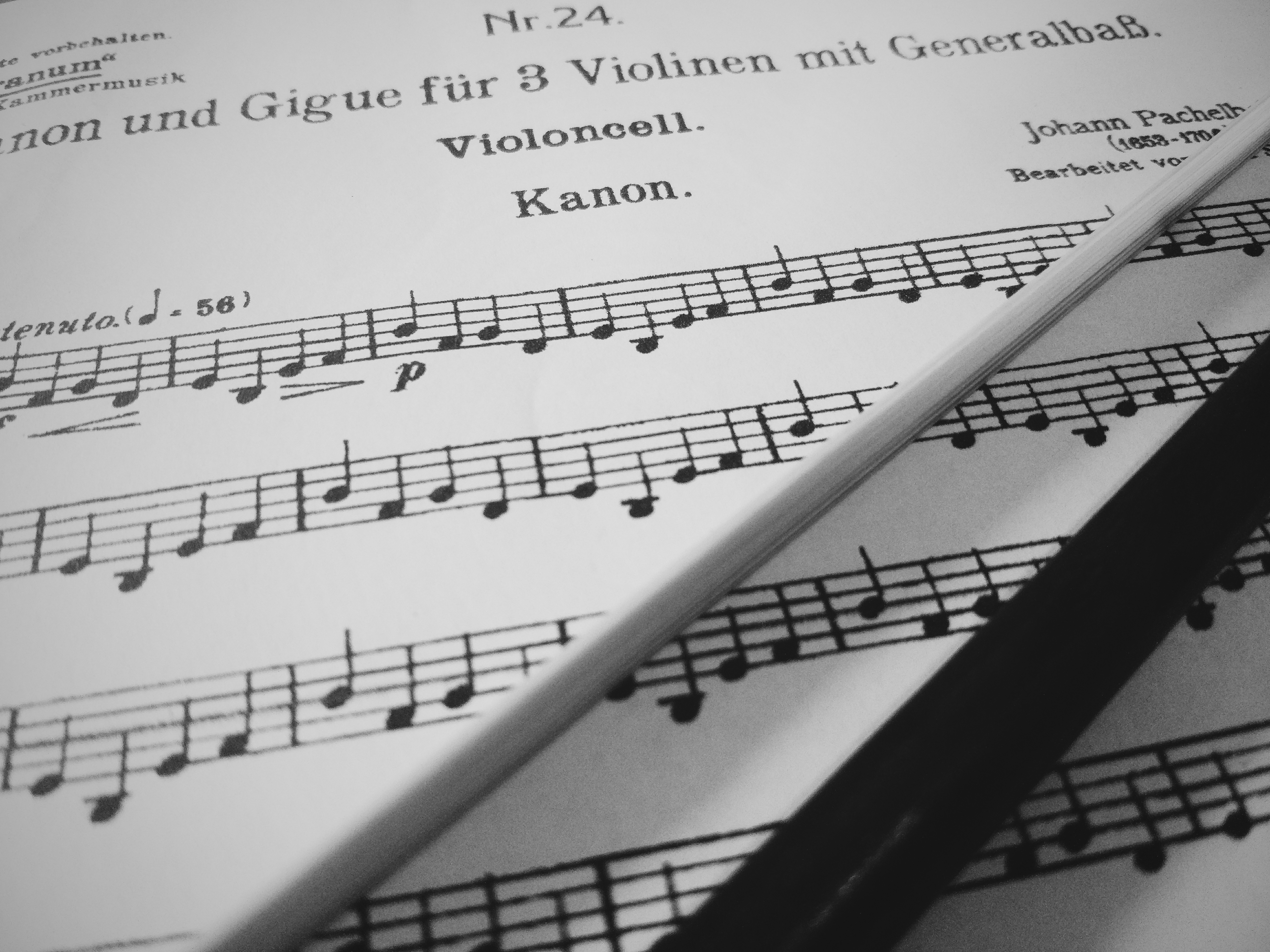
Canon in D is scary (and kind of annoying).
No, really. It's true, on the cello side of things.
It's one of the pieces that we love to hate, or hate to love.
Just think about it, throughout the entire piece, about four to five minutes of it, we only play the same eight notes over and over again. And if you playing for a wedding, good luck to repeating the song again_ノ乙(、ン、)_
Thank you, Johann Pachelbel, for making a famous musical work wherein you torture the cellists( ̄Д ̄
You gave the other string players interesting parts but made us sweat and grow bored with ours... So sad...
Generally speaking, I like this piece of music, but I don't like playing the cello part, unless it's arranged in a way that gives the cellos more interesting stuff to play.
Nobody knows much about the history behind this music. Some say it was for a wedding, but those are just rumors. And despite of cellists' problems with this particular piece, Pachelbel was quite good with composing (he created hundreds of works).
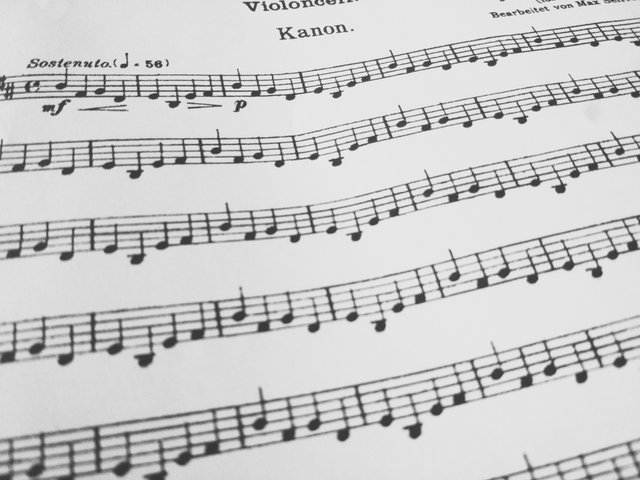
The reason I ended up writing about Canon in D was due to the fact that our temporary chamber ensemble conductor included the piece in our repertoire, and we practised it during our rehearsal last Sunday.
It wasn't a fun experience at all.
We had to repeat the same song over and over again while the conductor corrected some things in the other string sections. Like a song stuck in repeat, all the same notes over and over again...
Here, I got a video from Youtube that you can enjoy, listening to the same notes over and over again...
I'm wondering what went on in Pachelbel's head during the time he wrote this.
But at least our conductor had some mercy on the cello section, he told our principal cellist to arrange the cello part in a way that wouldn't be too boring for us (sorry Johann, but really, what could you do?).
Each cellist in the section ended up improvising, we played around with different rhythm patterns, created harmonic lines, played the melodic ones, stopped playing (LOL), etc. In short, we kind of fooled around during practice(>y<)
(But we're generally the most behaved section in the ensemble and the orchestra, conductors love us(^_−)☆)
Our principal cellist in particular had fun. After about fifteen minutes of playing the same notes again and again, being given leave to improvise unleashed his creative talents. He played in lower octaves, shifted to higher ones, went with syncopated rhythms, played along with the violins, messed around with harmonic lines... Yep, he had fun.
But, of course, we're not going to play like that in the concert XD (Our conductor would kills us if we did that).
Still, after all complains about the boring bass line, us cellists would play the our parts obediently.
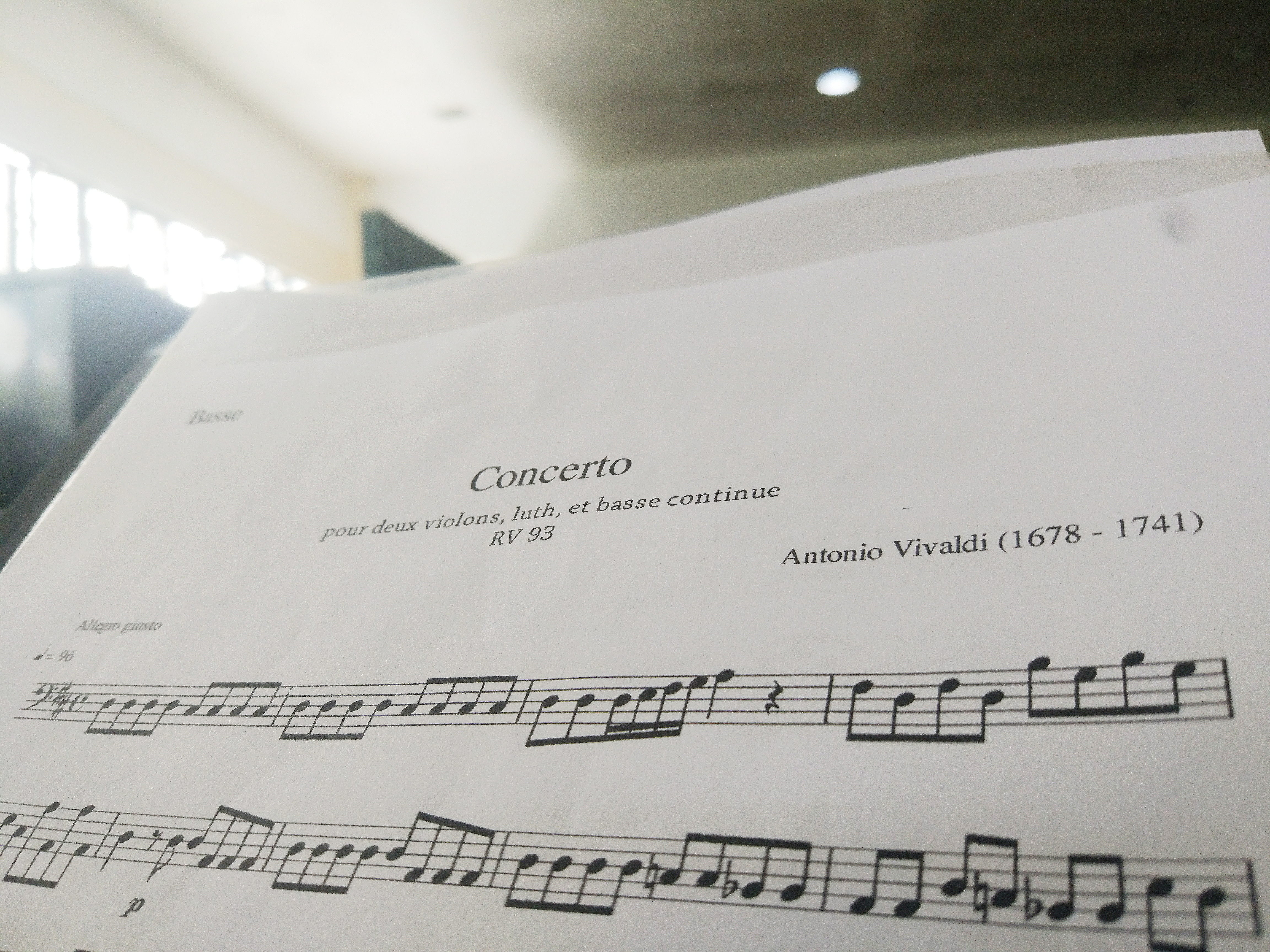
But while Pachelbel made an eternally repeating cello part (I'm exaggerating), Vivaldi can make cellists sleep.
I'm not joking.
Vivaldi created really excellent works of music, and the cello parts are usually interesting, but his slow pieces...
I've actually slept through rehearsals playing them. Maybe not slept in the sense that I did it deliberately, but fell asleep because of the really, really slow pace of the music and the cello part being rather dull. (Nothing against Vivaldi, the pieces are great, just sleep-inducing).
The first time I slept was a couple of years ago, when we rehearsed one of Vivaldi's works, In Et Terra Pax. This one's part of a larger work, Gloria, a religious composition, and involves the choir.
Coupled with the fact that practice was at eleven in the morning, just an hour before lunch, three times a week, the heat and hunger can tempt the mind to take a little nap. And me falling asleep happened several times, thankfully our conductor at that time would usually concentrate on the choir. My stand partner would wake me up with a poke of her bow when she saw that I was in dreamland, so I was never caught asleep.
But really, sleeping while playing... It's true though.
Let me put up a video of Et In Terra Pax. Listen to it while imagining a humid atmosphere, the voices of the singers mellow as you play cello part slowly, the bow sliding over the strings, your head nodding along in a kind of trance as little by little it draws you off to close your eyes...
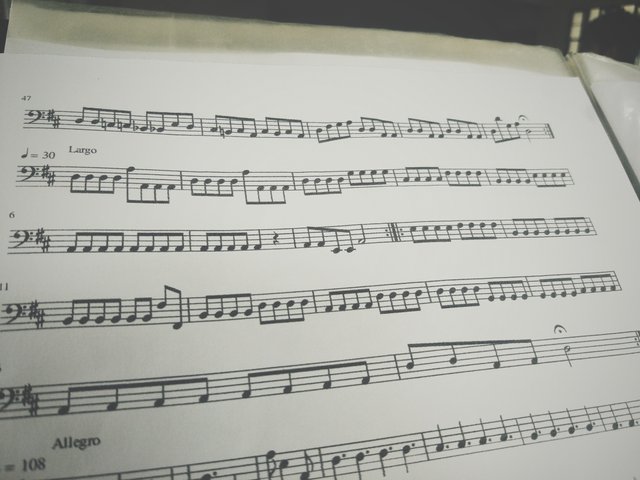
During our last practice, I ran into another sleep-inducing cello part by Vivaldi. This time, it was the second movement of one of his concertos.
And I fell asleep while playing, again. Just a short nap though. And our conductor this time had his attention in on the violins (again). Still wasn't caught.
I didn't do it deliberately though, the music was really just...sleepy? The part was made in the same style as the first one I encountered. Even the other parts were kind of mellow, the harmonies providing
But the rest of the other two movements were cheerful(?) and fun.
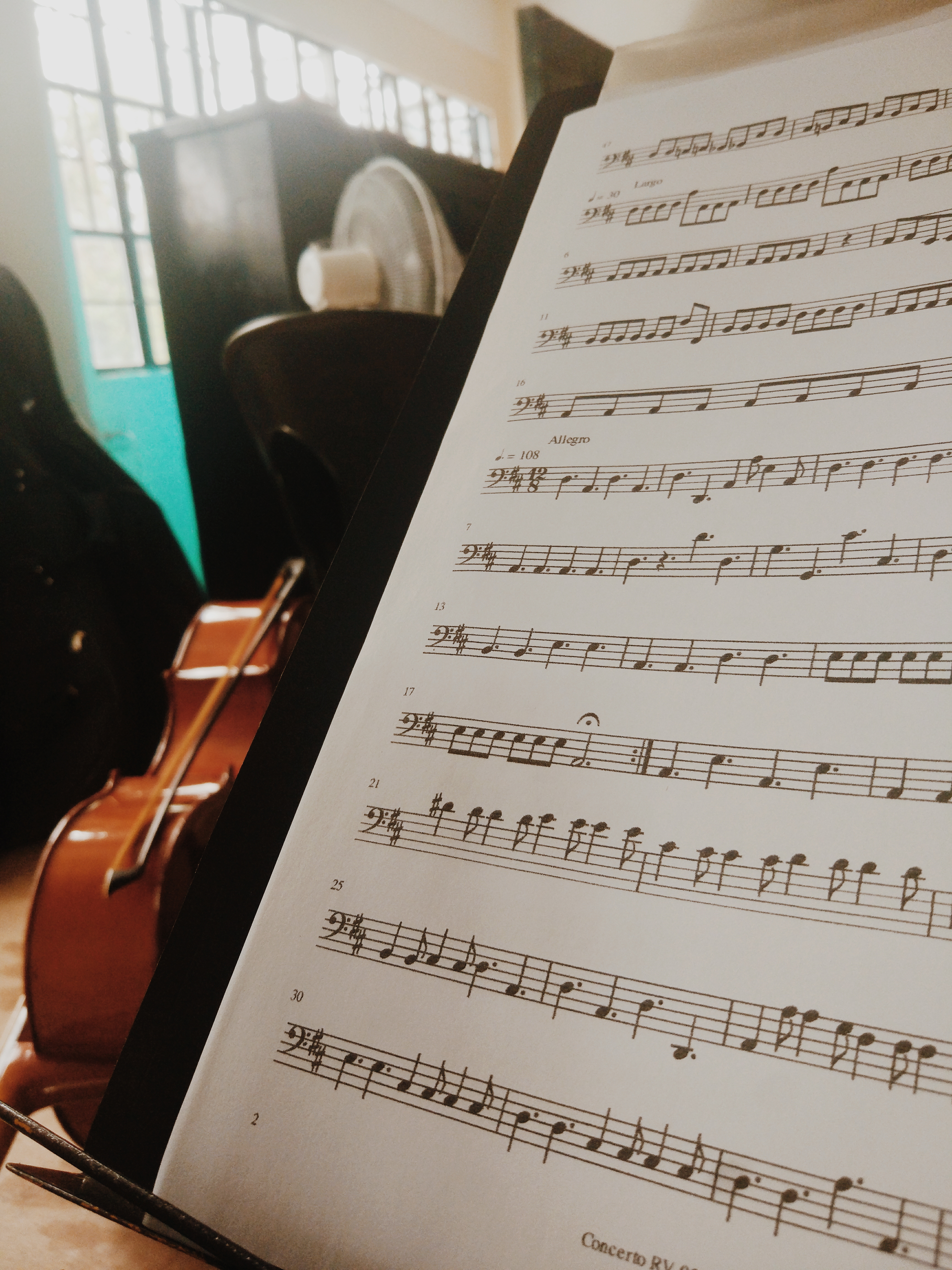
For those interested in classical music and would like to connect and share, @bengy started a Discord channel for it.
Check it out on Discord
Hi @tin-tin,
Thank you for this post. Although your frustration is real, I have to say that I enjoyed reading your rant. It reminded me of this youtube video.
It also reminded me of the poor piccolo player at a recent performance we attended of @beethoven's 5th Symphony. She had to sit there looking attentive with her instrument on her lap for 3 entire movements before she got to play in the 4th.
We thought you would like to know that we shared your post on the Steemit's Best Classical Music facebook page, and included in our latest Roundup post.
Congratulations on getting recognized by @curie for this entertaining bit of writing.
Downvoting a post can decrease pending rewards and make it less visible. Common reasons:
Submit
The struggle is real(>y<)Poor cellist, his companions are enjoying while he gets to stay alone and play the same eight notes over and over. (One of the cellists in our section plays the same rhythm the cellist in the video did when he started plucking XD He does it when he becomes frustrated with the part!)
Thank you, glad you enjoyed it (^ω^) And, poor piccolo player.
Downvoting a post can decrease pending rewards and make it less visible. Common reasons:
Submit
I sing bass in choir, and this struggle is so real in the bass section. Some pieces have a lot of great variation and can be challenging and fun, but sometimes we're performing a song that's 6 minutes long, and the bass section sings the same 4 measures over and over again. Yikes!
Downvoting a post can decrease pending rewards and make it less visible. Common reasons:
Submit
I love listening to the bass lines in choir pieces! That really deep sound that provides harmonic support... XD I guess it's the influence of being a cellist!
And yup, some pieces are technically boring for choir, the sopranos and altos get the good parts!
Downvoting a post can decrease pending rewards and make it less visible. Common reasons:
Submit
We basses always get excited for the more technically demanding stuff. :D
I not so secretly adore cello, for perhaps the same reason you listen for the bass line—it's the bedrock of the sound in so many pieces, and I love it!
Downvoting a post can decrease pending rewards and make it less visible. Common reasons:
Submit
Downvoting a post can decrease pending rewards and make it less visible. Common reasons:
Submit
(´⌣`ʃƪ)
So nice! This performance of Canon is pretty cool, because usually this work is played slower, but this had an energy that made it move forward (haha, I don't know how to put it in better words). Hmm, vivacious! That's the word :)
Downvoting a post can decrease pending rewards and make it less visible. Common reasons:
Submit
It is supposed to be a joyful piece, even at a wedding! Unfortunately, the modern traditional classical interpretations are not true to the original intent of Baroque, classical and even romantic composer's wishes and intents!
That's where the specialist field of Early Music tries to take up the slack!
Downvoting a post can decrease pending rewards and make it less visible. Common reasons:
Submit
I guess the people that made this piece popular were not studying their music history well :)
This is where we see the importance of studying music history, to understand what the composer actually wanted portray in their music, as well as to be able to use that knowledge in performance. ^_^
Downvoting a post can decrease pending rewards and make it less visible. Common reasons:
Submit
Congratulations @tin-tin! Okay, #classical-music, time for our baby community to try and help push out our first superstar post! Upvote, comment and resteem!
Downvoting a post can decrease pending rewards and make it less visible. Common reasons:
Submit
Classical music style:
Downvoting a post can decrease pending rewards and make it less visible. Common reasons:
Submit
The musicians in front of him should be mentally prepared, or else they'd lose their places in their parts! XD
Downvoting a post can decrease pending rewards and make it less visible. Common reasons:
Submit
Think they're more worried about losing their hearing!
Downvoting a post can decrease pending rewards and make it less visible. Common reasons:
Submit
Lol! I've seen this before, but it is the best!
Downvoting a post can decrease pending rewards and make it less visible. Common reasons:
Submit
Have you seen the video where the guy hit himself on the timpani and breaks the surface? That was also golden XD
Downvoting a post can decrease pending rewards and make it less visible. Common reasons:
Submit
I haven't seen that one, put it up here!
Downvoting a post can decrease pending rewards and make it less visible. Common reasons:
Submit
Downvoting a post can decrease pending rewards and make it less visible. Common reasons:
Submit
Ha ha! Although it looks like it is staged as part of the piece?
Downvoting a post can decrease pending rewards and make it less visible. Common reasons:
Submit
I believe that someone told me that it's actually part of the piece. But still, sympathies to the timpanist, I wonder how many times he had to do that for rehearsal? XD
Downvoting a post can decrease pending rewards and make it less visible. Common reasons:
Submit
This is well and truly past the $100 mark now, so we'll see what the benchmark is going to be in 5 days time!
Downvoting a post can decrease pending rewards and make it less visible. Common reasons:
Submit
Yes, I think that's all that our baby community can do now!
Downvoting a post can decrease pending rewards and make it less visible. Common reasons:
Submit
This is a great, well written and interesting post! And speaking of ''went on in Pachelbel's head during the time he wrote this'', he was probably like ''I'm gonna... I just gonna leave the cello do the same thing over and over again'' without actually thinking about the musicians.
Downvoting a post can decrease pending rewards and make it less visible. Common reasons:
Submit
Thanks! Glad you found it interesting :) I was only aiming for a rant with it though XD
In regards to Pachelbel, he was an organist... Maybe he didn't realize the sorrows of a cellist playing the same thing over and over again while the others get to play the interesting lines... ┐( ̄ヘ ̄)┌
Downvoting a post can decrease pending rewards and make it less visible. Common reasons:
Submit
Many of these dances (in this case not a dance) based upon a ground bass tended to be quite repetitive for the bowed bass. This is particularly extreme example of it though!
Often the other continuo (harpsichords, lutes, harps) would be improvising freely anyway. It would not be unusual for the bowed instruments to join in. As long as the general affect and structure of the piece was not disrupted!
Downvoting a post can decrease pending rewards and make it less visible. Common reasons:
Submit
That means that those playing continuo parts were great at improvising, or should be! Or else, if they played non-harmonic notes when they shouldn't...They would be in big trouble!
Downvoting a post can decrease pending rewards and make it less visible. Common reasons:
Submit
They were! Improvisation is a lost art in classical music. It used to be done in all instruments, and it was a normal thing to be able to do it well and in the style and affect of the piece. Early music has brought some of this back!
Downvoting a post can decrease pending rewards and make it less visible. Common reasons:
Submit
Very nice 👏😎🎹
Downvoting a post can decrease pending rewards and make it less visible. Common reasons:
Submit
Thanks a lot :)
Downvoting a post can decrease pending rewards and make it less visible. Common reasons:
Submit
Hey there
Im not even a fan of classical music, but this post absolutely intrigued both my human master (@markangeltrueman) and myself. Its hard to believe that such amazing music can in-fact, be boring to play :). It's a real great insight, so thanks!!
I've re-steemed this on the @steemsearch blog and congrats on the curie upvote. The rest of your blog is awesome too, keep up the good work
The Curator
Downvoting a post can decrease pending rewards and make it less visible. Common reasons:
Submit
Thanks (ノ^∇^)
I never expected that a rant about Pachelbel could be curied. While there can be complaints about boring bass lines, the cellos do provide important harmonic support in musical works, so playing sleep-inducing parts are necessary :)
Downvoting a post can decrease pending rewards and make it less visible. Common reasons:
Submit
World of Photography Beta V1.0
>Learn more here<
You have earned 5.05 XP for sharing your photo!
Daily photos: 1/2
Daily comments: 0/5
Multiplier: 1.01
Server time: 06:55:32
Total XP: 45.90/100.00
Total Photos: 9
Total comments: 0
Total contest wins: 0
Follow: @photocontests
Join the Discord channel: click!
Play and win SBD: @fairlotto
Daily Steem Statistics: @dailysteemreport
Learn how to program Steem-Python applications: @steempytutorials
Developed and sponsored by: @juliank
Downvoting a post can decrease pending rewards and make it less visible. Common reasons:
Submit
Nice
Downvoting a post can decrease pending rewards and make it less visible. Common reasons:
Submit
Thank you.
Downvoting a post can decrease pending rewards and make it less visible. Common reasons:
Submit
Great article job well done. I had no idea how boring that was when you isolate the cello. You poor guys I'm forever sympathetic to wedding cellists
Downvoting a post can decrease pending rewards and make it less visible. Common reasons:
Submit
You got a 1.45% upvote from @buildawhale courtesy of @bengy!
If you believe this post is spam or abuse, please report it to our Discord #abuse channel.
If you want to support our Curation Digest or our Spam & Abuse prevention efforts, please vote @themarkymark as witness.
Downvoting a post can decrease pending rewards and make it less visible. Common reasons:
Submit
A little gift from your friends at #classical-music and the dischord channel! https://discord.gg/ppVmmgt. Yeah for our superstar!
Downvoting a post can decrease pending rewards and make it less visible. Common reasons:
Submit
XD Thanks a lot. You guys make great cheerleaders. Here's a cheer for the classical music community and the excellent people that are part of it! :)
Downvoting a post can decrease pending rewards and make it less visible. Common reasons:
Submit
Awesome!
Downvoting a post can decrease pending rewards and make it less visible. Common reasons:
Submit
Thank you :)
Downvoting a post can decrease pending rewards and make it less visible. Common reasons:
Submit
Interesting. I would never have thought that Canon or Vivaldi's music would be described using the words "hell" or "sleepy time." But I aint a musician, and I don't have to produce or perform the material. ☺
Of course, even these great pieces of music can be played wrongly or dully or slowly. And on modern instruments that may be different from those used by orchestras back when these pieces were written. So, when we hear a great piece such as the version in @musicapoetica's comment, we can appreciate it more and fall in love with the piece again.
You've probably heard of the Vienna Baroque Orchestra, which plays on "period instruments" – and plays most pieces just a little bit quicker than we are used to today. Apparently, that's the way they were intended to be played. Below is just one great performance.
Also, speaking of "eternally repetitive, sleep-inducing music," have you ever had a chance to play Terry Riley's minimalist masterpiece "In C"? Apparently if you want to fall asleep during your performance of "In C," you have the composer's blessing.
Any and all musicians can start playing the music at any time, stop at any time, start again, repeat ... ad infinitum. Plenty of opportunity for a tired musician to take a much-needed nap.
...
Downvoting a post can decrease pending rewards and make it less visible. Common reasons:
Submit
Ahhh〜( ̄▽ ̄〜) I was exaggerating when I called it 'hell'. It's more, boring then actual hell, but it could be torture if you had to repeat it the entire thing several times ;) And Vivaldi, his pieces are brilliant, really. I just love his violin concertos! But the cello parts for his slow movements are...sleepy XD
And, yep. I think there are a lot of pieces nowadays being played not in the style that the composer actually wanted. After all, there are times that it's hard to know one's intentions just from writing...
So musicians who manage to stick to the originals are actually very admirable, it means they really studied the composer, the style, the era when the piece was composed, etc. In a way, they're not just playing music, they're also researching it. You can think it as them trying to keep a musical legacy alive :)
And I haven't seen the minimalist piece you mentioned, but it sounds interesting. If they're doing what they want, does it mean they're improvising? Or are they following a score?
Have you seen John Cage's 4:33? My brother actually had the guts to play it for an end-of-semester recital XD I respect the composer's intention with the music, but the opening and closing of the piano was kind of funny. When we watched a video of it for a music history class, it was the first time I saw the head of our department laugh so much that tears came out...
Downvoting a post can decrease pending rewards and make it less visible. Common reasons:
Submit
Good points. Musicians who diverge from the originals should have a good reason for doing so, or else should not diverge at all. If they do, it's basically a re-interpretation, and it should be presented as a re-interpretation.
Of course, any musician is free to present any piece as they wish, but for most classical and baroque pieces, they are such magnificent works of art that there's typically no reason to get creative. Leave 'em as they are, and play them as they are.
Then again, if they can make something more beautiful than the original, I'll listen to it!! Gladly
For "In C," apparently there's a short score comprising a number of short melodic fragments, which are meant to be played in order. But any musician can start at any time, play each fragment one or twice or a dozen or a hundred times, before moving on to the next fragment. Or s/he can take a break, but then restart where s/he left off.
The performance continues until the final musician plays the final fragment for the last time.
It creates some very beautiful and hypnotic music. The first time I heard it was when I found a version done by a Chinese orchestra in a used CD shop. It looked very interesting, so I bought it. Only later did I learn about it and hear different versions.
I'd say your bro had some guts. Did his performance go over well with the prof?
Downvoting a post can decrease pending rewards and make it less visible. Common reasons:
Submit
Yup, in baroque and classical it's better to play them in they way they were supposed to. Unlike in romantic music where expression is highly encouraged, when it comes to the earlier ones, the composer usually has something specific to convey. Sometimes deviating from the original turns the piece into something different than what was intended in the first place.
But if the performer's intention was to interpret it in the manner they want to, as long they don't completely turn it into something else...
I watched the 'In C' on Youtube after you mentioned it. It's fascinating how the composer managed to create it in a way that musicians stopping and starting anywhere isn't affecting the flow of music. Unlike in works during the baroque, classical, and romantic period, doing so in those works would end up completely destroying a performance. Contemporary composers come up with innovative ideas!
Our teachers were amused. They didn't scold him either, after all, it's a certified piece of music (music being an organization of sound and silence, though more on the silence part than anything else).
Downvoting a post can decrease pending rewards and make it less visible. Common reasons:
Submit
That distinction between romantic on the one hand and baroque and classical on the other is interesting. I'd never heard nor realized that.
Yes, "In C" is a fascinating concept. There are many different performances of it, and each one is interesting. Some are truly sublime.
Downvoting a post can decrease pending rewards and make it less visible. Common reasons:
Submit
Classical and baroque music relied a lot on following existing music theories of the time, and while expression was encouraged, it was only to a degree. Excessive expression and deviation from theory was frowned upon, which was why Beethoven was also heavily critiqued though also lauded.
The 'In C' that I watched was performed using mostly African instruments, this one
I realized that because of how it was arranged, each is really different from the next, each unique.
Downvoting a post can decrease pending rewards and make it less visible. Common reasons:
Submit
Lou Reed once said that writing rock songs was difficult, and that he spent a lot of time on it. He added, as you imply above, that classical composers had it easy, cuz they just had to sit down and follow the rules. Then, everyone would listen to their music.
https://steemit.com/nowplaying/@majes.tytyty/lou-reed-lyrics-22-anyone-who-ever-had-a-heart-from-sweet-jane-now-playing-week-7
Downvoting a post can decrease pending rewards and make it less visible. Common reasons:
Submit
I don't know anything about rock, my preferences don't really lean towards it. But I do believe that both genres have their own difficulty in composition :)
Downvoting a post can decrease pending rewards and make it less visible. Common reasons:
Submit
Same ensemble, same music, different time and place.
Downvoting a post can decrease pending rewards and make it less visible. Common reasons:
Submit
They actually got an authentic African ensemble for it. I thought they just got people from around US for the performance. :)
Downvoting a post can decrease pending rewards and make it less visible. Common reasons:
Submit
No wonder my cousin was both a pianist and cellist - that way she can avoid the boring cello parts and also get lots of exercises carrying that cello case around (she wouldn't let me carry it for her - must be a cellist thing)... (^^;)
Downvoting a post can decrease pending rewards and make it less visible. Common reasons:
Submit